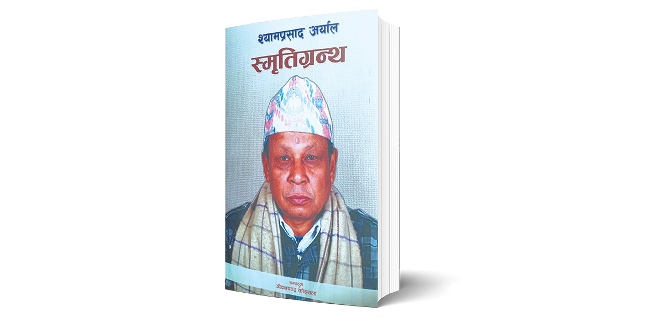Shyam Prasad’s Contributions

Gandhi Raj Kafle
The under review publication edited by Jeevan Chandra Koirala focuses on life and works of late Shyam Prasad Aryal, who has left an indelible mark of social works for society. What are Aryal's works that we need to remember and cherish after his demise?
Let us also relate Aryal's contributions in the context of the world views about social works. There are many personalities, who have attained global fame.
Microsoft founder Bill Gates is one such personality in our times, who is known all over the world for his charity activities. And, there are quite a lot of such organisations, which are set up in the names of world-famous personalities to promote social causes.
It seems the US is ahead in this line of vision because we can find many institutions even in the name of many former presidents there. Many of these institutions have aimed to promote philanthropic activities in the world.
Though our general views and understanding regarding philanthropic activities in Nepal are still weak, the limited number of inspiring personalities who faced every odd and worked sincerely and selflessly to establish social institutions to help needy and helpless people are also there to remember.
Shyam Prasad Aryal's name falls into this category because of his selfless work. This is one of the relevant publications, which reminds us of his contributions to promoting social causes.
This book, which helps remember social works performed by Aryal, is divided into six parts. The first part presents his biography and the second one is for collection of articles written by late Aryal’s well-wishers.
All the information accumulated in the first two parts of the book helps us know how accommodative and loving he was among friends. Similarly, the third and fourth parts mention creative writings of Aryal, which he wrote with deep creative interest and for different purposes and contexts. The fifth and sixth parts, however, are a presentation of important citations and recognitions bestowed upon him and his memorial photographs.
This all is the synopsis of this 330-page memorial book.
But, what is the lesson to learn from the personality of Shyam Prasad Aryal? The prominent religious book of the Gita has a memorable warning: Fruits of work never vanish; it exists even after death. The good work has good fruit and bad work has bad fruit.
Works done without desire and selflessly is sacred and it frees man from the bond of material life and finally gives salvation.
The publication of this memorial book on Aryal’s personality is something, which has come out from good impact and influences he left behind after his demise among his well-wishers, including his family members. The book claims Aryal’s soft approach while performing social works was impactful even to opponents.
This book has so many such examples. But, one such, which is oft-quoted by some of the authors in this book, is related to late B.P. Koirala himself. The foundation laying ceremony of the statue of Great Poet Laxmi Prasad Devkota at the Ratna Library at Baneshwor had been inaugurated by popular poet Bhupi Shechan. But, memorably the unveiling of this statue had been done by B. P. Koirala. It was hard to do it in the Panchayat years because to invite B. P. for the official unveiling of the statue was meant to receive the wrath from the diehard opponents. But, even this thing had become possible then.
Surprisingly, many authors in this book remember that B. P. Koirala, too, did a different work there. He delivered a non-political speech: He talked about the Nepali literature, Laxmi Prasad Devkota (the Mahakavi of the country) and the then new literary experiment of the contemporary authors and poets of Nepal.
Shyam Prasad’s well-wishers have fondly remembered that it is due to the Aryal’s soft approach in working which had enabled him to accomplish a difficult act.
Today, we have democracy and the liberal system, which allows everyone to work freely and fearlessly as per laws of the land. Yet, we still need inspiration and for such inspiration, we have to remember personalities like Shyam Prasad Aryal.
His selfless contributions to diverse fields of society as focused by this book are inspiring. In conclusion, this book has documented the works and writings of late Aryal through which we can remember him in future. All the persons - editor Jeevan Chandra Koirala, all the authors and Sarala Aryal, the wife of late Aryal - who felt the need to bring this book out, deserve our applause.
Recent News

Do not make expressions casting dout on election: EC
14 Apr, 2022
CM Bhatta says may New Year 2079 BS inspire positive thinking
14 Apr, 2022
Three new cases, 44 recoveries in 24 hours
14 Apr, 2022
689 climbers of 84 teams so far acquire permits for climbing various peaks this spring season
14 Apr, 2022
How the rising cost of living crisis is impacting Nepal
14 Apr, 2022
US military confirms an interstellar meteor collided with Earth
14 Apr, 2022
Valneva Covid vaccine approved for use in UK
14 Apr, 2022
Chair Prachanda highlights need of unity among Maoist, Communist forces
14 Apr, 2022
Ranbir Kapoor and Alia Bhatt: Bollywood toasts star couple on wedding
14 Apr, 2022
President Bhandari confers decorations (Photo Feature)
14 Apr, 2022










